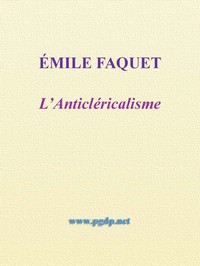| Summary |
"L'Anticléricalisme" by Émile Faguet is a historical and philosophical examination written in the early 20th century. The work explores the longstanding anticlérical sentiment in France, analyzing its roots, manifestations, and implications for the national character and societal behavior. Faguet intends to approach the subject impartially, providing insights into the interplay between religion, politics, and the French psyche. The opening of "L'Anticléricalisme" introduces Faguet's study of what he considers a pervasive and deep-rooted malady within the French character—anticléricalism. The author begins by discussing the dual nature of French identity as both inherently religious and irreligious, suggesting that this paradox has shaped historical conflicts and societal attitudes. He critiques the notion that past religious wars were driven predominantly by sincere faith, arguing instead that they often served as covers for political and social battles. Faguet emphasizes the French tendency towards skepticism, lightheartedness, and a penchant for conflict, positing that these traits contribute to a general aversion to traditional religious authority. Through this lens, he sets the stage for a broader exploration of the historical and cultural dimensions of anticléricalism in France. (This is an automatically generated summary.)
|

